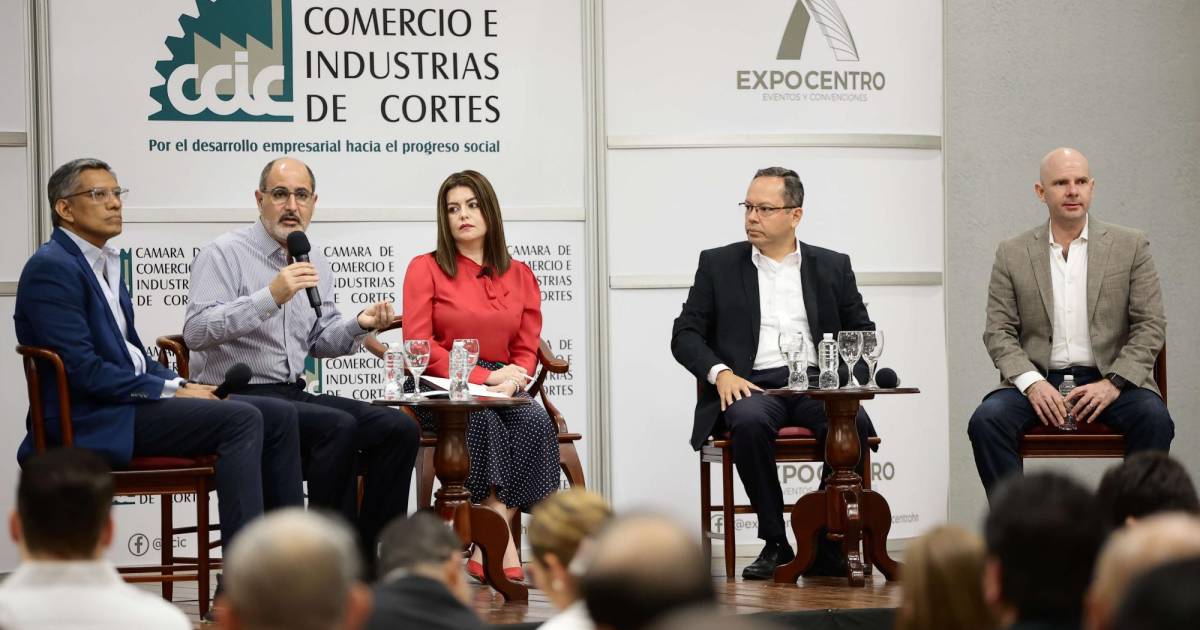Global Courant 2023-05-17 11:17:33
The Tax Justice Law It is not aimed at achieving competitiveness or encouraging investment and it will not favor the micro, small and medium enterprises (mipyme), according to the business sector.
Eduardo Facussepresident of the Chamber of Commerce and Industries of Cortés (CCIC); Pedro Barquero, former Minister of Economic Development; Rafael Delgado, president of the College of Economists of the northwestern zone, and Aníbal Cálix, former deputy of the Anti-Corruption Party (PAC), analyzed the consequences of the draft Tax Justice Law as it was sent to National Congress.
In the event, which was open to the public, and which had a high turnout, it was revealed how since the possibility of this law began to be discussed, foreign investors who planned to settle in Honduras went to other countries and how Maquilas and small suppliers in the textile sector and other industries are already being affected.
“I would like to talk about the spirit of the law, many public accusations have been made, that we do not want to pay taxes, I can properly say, that the affiliation of the Cortes Chamber of Commerce It is one of the ones that pays the most taxes, it has no basis for what we are accused of,” he asserted. Eduardo Facussein his first participation.
The business leader reiterated that they are against the abuses and violations of the law for their own benefit. “What this law seeks is to rationalize exemptions and greater transparency to avoid tax evasion, but in the end we are concerned about two issues; One is that the country will lose competitiveness, because that would drive away investment, it would drive away jobs and opportunities.”
Former Minister of Economic Development
Peter Boatman:
“We all support the elimination of abuses, but they neglect the issue of competitiveness.”
Facussé referred specifically to global income (the law intends to change the principle of income from territorial to global, according to the project, to avoid the diversion of profits and profits from large companies to tax havens.
“But none of the Central American countries, our neighbors have it, that would leave us at a disadvantage,” he said. All the panelists emphasized that there is no point in the law that makes a commitment to the public sector to make good use of taxes and how the collection will impact the improvement of health, education and other services to the population.
The panelists also agreed that there are pending tasks that the Government must resolve, such as legal certainty, citizen security, improvement and lower costs of electricity, infrastructure projects, among others.
To know
Yes jobs will be lost. It was highlighted that in 2022 18,000 formal jobs were generated, and 50% of them were through the schemes.
“I think that perhaps due to bias or ignorance, in many of the articles we are really reducing the country’s competitiveness, an example, the article that talks about the exempt purchase order (it is that instead of paying the sales tax and then return it, generate a document on an electronic platform with which they make an exempt invoice to your provider) and, the argument is that we are the only country in Latin America that has it, it is a benefit for the investor, but here it is seen as negative”, commented the former deputy Hannibal Calix.
the former minister Peter Boatman He was punctual in saying that the law is a tool that will have a negative effect on attracting new investment, generating employment and reducing poverty. “We do not have a solid rule of law, we do not have legal security, high energy costs and the few attractions are the special regimes.”
President of the CCIC
Eduardo Facusse:
“In the last 10 years, taxes have gone from L52,000 million to L144,000 million.”
Barquero explained that in 2023 foreign investment increased versus 2022. “What I have seen, from having personal contact with investors, is that investments stopped with the news of the new law, mainly from maquila from the United States and Asia ”.
The Economist Raphael Delgado He opined that competitiveness is not achieved with the law, but he assures that the law can become one of many pieces to assemble “the puzzle” and achieve competitiveness.
“The law is necessary, but not sufficient, the spirit of the rule is to create a different image than the one we have had in the country about how public policies are managed,” he said.








